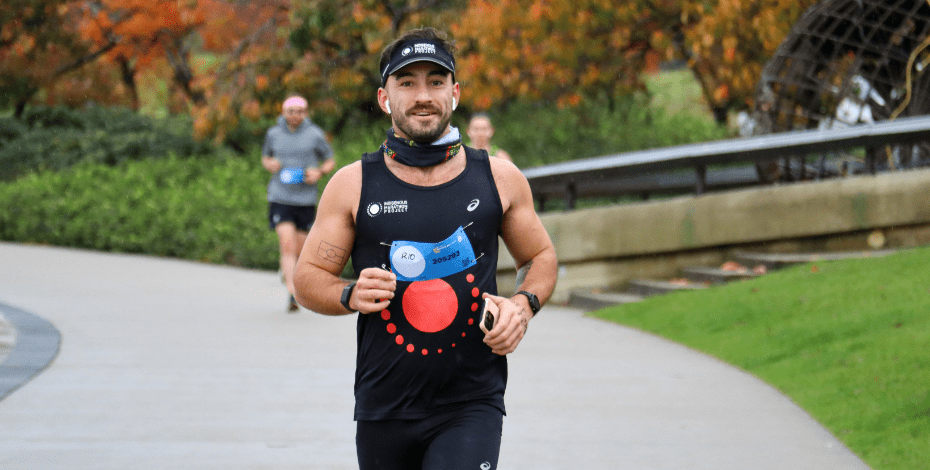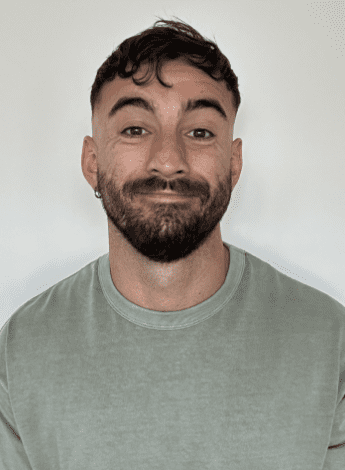
Running marathons to close the gap

RECONCILIATION Canberra-based physiotherapist Jyedn Murray is a participant in this year’s Indigenous Marathon Project, which trains Aboriginal people and Torres Strait Islanders to run a marathon.
Later this year, Aboriginal physiotherapist Jyedn ‘Jye’ Murray APAM plans to run the New York City Marathon—his first international full-length marathon—as a member of the Indigenous Marathon Foundation (IMF) 2024 Indigenous Marathon Project squad.
The IMF was set up in 2009 by renowned Australian marathon runner Robert de Castella to celebrate Aboriginal and Torres Strait Islander peoples’ cultures, strength and achievements and to empower inspirational leaders through running.
Each year, its flagship Indigenous Marathon Project selects 12 Aboriginal and Torres Strait Islander people aged 18–30 to train for the New York City Marathon—many with little experience as a distance runner.
Since its inception, 132 graduates have completed major international marathons in New York, Boston, Tokyo, London, Paris and Berlin.
Jye is a Wiradjuri-Ngemba man from Cowra in New South Wales, working for Canberra practice PhysioSport.
His journey to marathon running started in 2021 when one of the running coaches for the program ended up on his physio table.
‘We got to yarning and I was telling him a bit about my background and he told me their team physio couldn’t travel to a lot of things because of COVID-19 and that there were few runners running their marathon in Canberra,’ Jye said.
‘He said, “We need someone to help and given your background and everything, it’d be really great if you could do it.”
‘I said, “Absolutely.”’
Jye’s involvement that year piqued his interest in trying out for the program himself, but it took him a couple of years to find the space in his schedule—in addition to working as a physiotherapist and training with the IMF, he is a tutor for the University of Newcastle’s physiotherapy program and has many family and community ties back in Cowra.
Earlier this year, however, he made the decision to try out and got into the program.
‘I was very grateful to get in.
‘I think there were about 200 people who applied but they only take 12,’ Jye says.
‘Everyone I’ve spoken to who’s done it says it’s a life-changing experience.
‘I’ve only done one camp so far and it was definitely life-changing for me.’
Members of the squad, based across Australia, train locally and come together for week-long intensive camps to meet inspirational leaders and past participants, complete educational components of the program and take part in running events, building up their ability to run longer distances.
‘It’s a real community, a family.
‘From the first couple of hours of the first camp, everyone gelled and became really close and we all talk to each other every single day, helping each other through the struggles,’ Jye says.
With more intensive camps coming up, Jye is training hard through the cold Canberra winter mornings under the supervision of his coach Hope Davison, a former graduate of the program.
In the coming months he’ll run a half marathon for the Gold Coast Marathon and a 30-kilometre race in Alice Springs in September, after which the final squad for New York will be selected.
In the meantime, he is also working on the educational side of the program—a Certificate in Indigenous Leadership and Health Promotion.
It’s an essential element of the program, which aims to create not just runners but future leaders for Aboriginal and Torres Strait Islander peoples and communities across Australia.
This is an area that Jye feels passionately about contributing to—as a physiotherapist, he believes he has a role in helping his community close the gap in healthcare.
Growing up in the Aboriginal community in Cowra, he was exposed to many of the health disparities faced by Aboriginal and Torres Strait Islander peoples but he also had role models showing him how people are tackling it, including relatives working in nursing and in drug and alcohol rehabilitation and his father, who graduated as a school teacher while Jye was at school.
‘I’ve always just grown up with this sort of burn in me, thinking, right—I want to do something about that,’ Jye says.
‘Around three years ago I started to feel like I’ve got enough knowledge, at least enough skills to try to give back somehow to the community.’

Physiotherapist Jyedn Murray is training for the New York Marathon as part of the Indigenous Marathon Project.
Jye is active on social media, where he covers topics from Reconciliation and the Closing the Gap project to cultural sensitivity and allyship.
He’s taking a two-pronged approach— work with community to inspire and teach them to live healthier lives and work with non-Indigenous healthcare workers to teach them better ways of working with Aboriginal and Torres Strait Islander people and communities.
‘I want to inspire Aboriginal and Torres Strait Islander people to live healthier lives by example.
‘So I’m showing them how I’m trying to do it and I’m going to help them break down barriers to doing it themselves.
‘My approach has evolved and is now a bit more culturally centred—looking at how we can incorporate culture, how we can lean on the cultural determinants of health and provide education about how we got to the position we’re in and the barriers to health,’ Jye says.
‘With that knowledge, people then have more of an idea of why we are where we are and how to map an alternative path to get better results.’
Through his social media account, Jye talks about ways that Aboriginal and Torres Strait Islander people can use their culture and tradition to boost their health and wellbeing.
‘I’m trying to make people aware that we can offset the things that have put us in a bad position—the social determinants of health—with our cultural domains of health.
‘So it’s not just about going out for a walk to be healthier.
‘Walk on somewhere of ancestral significance.
‘When I go home to Cowra, I’ll always run around the river or somewhere that’s important to my family.
‘That way you’re getting a connection to Country, to your ancestral ties, and that has a powerful impact,’ he says.
He advocates learning about local and traditional foods that can be added into a person’s regular diet, along with bush medicines and exercising with family members to strengthen family and cultural ties.
‘Just by adding these things into the generic approach, we get so much more out of it.
‘People feel a lot safer—they feel the power of being connected to their culture—and then they’re more likely to do it and to get the benefits of it,’ Jye says.
Jye is currently planning to organise some community yarning sessions that bring local community members together with healthcare professionals who can talk to them informally about health and wellbeing.
He’s also applying that to the other side of the equation by helping to provide non-Indigenous health workers with culturally safe and appropriate practice skills.
He’s interested in giving healthcare workers like physiotherapists frameworks and protocols to help them implement culturally safe practices.
‘We’re healthcare professionals; we need actionable steps.
‘I’ve made a resource based on that, where people can sit there and go okay, these are the areas we need to work on and here are actionable things that I can do to work towards that,’ he says.
It all adds up to a very busy year for Jye but that’s part of the IMF experience, he says.
‘Between working, managing the uni job, training and then also trying to get the course work done for the certificate, there’s a lot to do.
‘Really, it’s a great test for whoever’s going to make it to New York and finish that marathon,’ Jye says.
>> Follow Jye on Instagram @thekooriphysio and visit the Indigenous Marathon Foundation for more information on its programs.
© Copyright 2025 by Australian Physiotherapy Association. All rights reserved.





